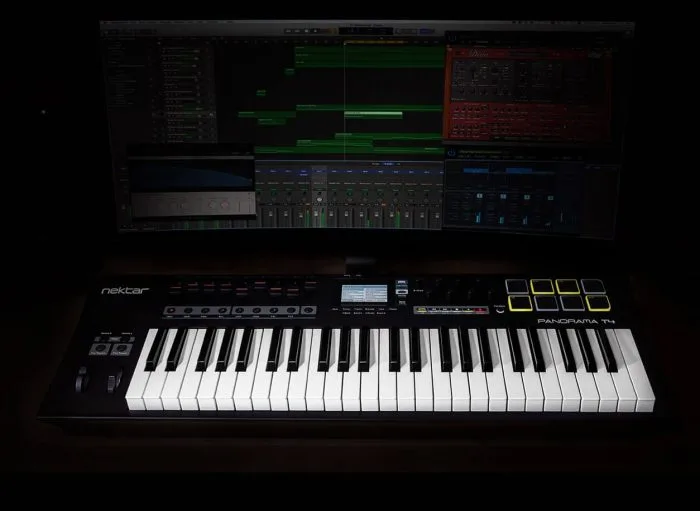Nektar Technology has announced a new Panorama T-series MIDI controller keyboards that bridges the gap between the Impact LX+ and Panorama P-series.
Panorama T4 and T6 deliver a new level of system integration with deep instrument plugin control in any VST/AU compatible host, DAW control, new performance features and extensive MIDI functionality for more user choices than ever before.
Panorama T4 and T6 bring the touch and feel of hardware synthesizers to virtual instruments by providing instant access to plugin parameters from the hardware.The T-series controllers achieve this courtesy of the new Nektarine plugin control manager software. With Nektarine, Panorama users can control any VST, VST3 or AU instrument with one of the many included maps or by creating their own. Every plugin parameter change is instantly visible on the hardware display.
Nektarine’s graphic UI makes the customization of existing maps and the creation of new ones easy. Maps can be as simple or comprehensive as required, screened synth parameters below Panorama T4/T6’s buttons in the fader section can even be mapped to access parameter groups in plugins such as Oscillator, LFO or Filter. So the encoder mapping will follow suit at the press of a button, multiplying the number of available hardware controls manifold. Nektarine also includes patch library management, making a plugin’s sounds effectively cross-DAW compatible, simplifying the use of plugins across multiple DAWs.
DAW control of almost any available DAW is also included: Even without installing any additional software, standard mixing, track selection and transport functionality work out of the box if a DAW is MCU (Mackie® Control Universal) compatible. Advanced features, like access to mixer sends or smart controls in Logic, “grab” plugin control in Reaper or Cubase and device control in e.g. Reason or Bitwig becomes available once Nektar DAW integration is installed.
Nektar DAW integration is a complete DAW control experience, but the addition of Nektarine expands it with a comprehensive plugin instrument control system.
“Nektar is known for stretching the limits of what’s possible with DAW integration and we continue that work with the new Panorama T4 and T6”, says Nektar chief Niels Larsen.
“The introduction of Nektarine allows us to go beyond a DAW’s control options. It delivers a discreet, consistent user experience with expanded functionality such as hosting of up to 8 plugins at a time, map editing and patch browsing from Panorama T4/T6. And because Nektarine runs in any VST/AU compatible DAW, Nektar plugin control is now accessible to music creators using almost any DAW, for the first time.”
No less than 62 physical hardware controls, buttons and faders put a lot of control power under musician’s fingertips – and that’s not counting shift or alternate functions. The crisp LED Display provides real-time parameter names and feedback. A 49 or 61 key 2nd generation synth-action keyboard with medium tension and aftertouch ensures expressive playability. This list could go on: A fader bank with nine 30 mm faders, 8 LED buttons, 8 encoders, illuminated transport controls, 8 LED drum pads with aftertouch, …
The new Note Repeat feature for keys and pads offers many real-time parameters and its own fully MIDI-syncable on-board timing engine. This provides players and producers alike with new creative tools: From staccato chords to programming hi-hat lines with varying accents simply by activating the Repeat button, there are many creative applications for this new feature. Chords can also be learned to the pads, making it possible to play complex solos and chords at the same time, even sending data on different MIDI channels.
Together, a Panorama T-series keyboard, the Nektarine software, and Nektar DAW Control provide a powerful integrated system experience, further closing the gap between software and hardware.
The Panorama T4 and T6 will ship in July 2018 for a MSRP of $349.99 USD / £279.99 GBP / 349.99 EUR and $399.99 USD / £349.99 GBP / 399.99 EUR, respectively.
More information: Nektar Technology
 Save up to 95% in Plugin Boutique's Spring Sale!
Save up to 95% in Plugin Boutique's Spring Sale!




